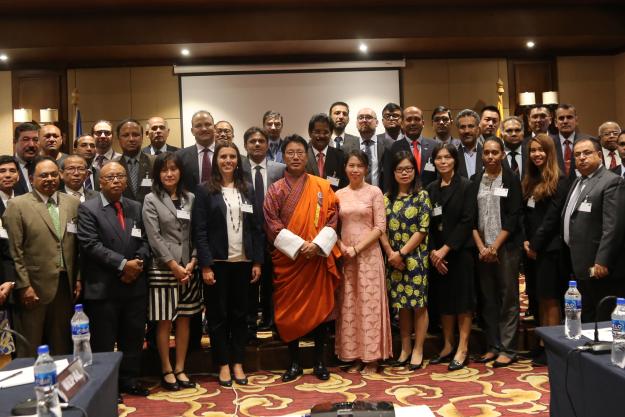
Participants discussing the role of customs administration in the implementation of the transfers regime of scheduled chemicals under the Chemical Weapons Convention
THE HAGUE, Netherlands — 29 June 2018 — The role of customs administration in the implementation of the transfers regime of scheduled chemicals under the Chemical Weapons Convention (CWC) dominated the discussions at the annual Regional Meeting of National Authorities from Asia, held in Bhutan from 19 to 21 June.
In his opening remarks, the Minister of Foreign Affairs of the Kingdom of Bhutan, H.E. Mr Damcho Dorji, stated that customs officials “are at the frontline of implementing the transfer regime”. Given the growing threat of the use of toxic chemicals by non-State actors, the Minister noted that, “the application of enhanced oversight of transfers has become especially critical for overall international security”.
The meeting provided an opportunity to reflect on the ongoing efforts of OPCW Member States to advance the national implementation of the CWC.

Participants at the annual Regional Meeting of National Authorities from Asia, 2018.
A number of participating countries reported on their progress in enacting legislation to implement CWC provisions domestically.
The participants further described the challenges of implementing an effective transfer control regime, and devised ways of overcoming them. The need for customs-related capacity building was underscored, and many attendees stressed OPCW’s role in providing such educational activities.
National Authority and customs bodies from 22 OPCW Member States attended, and were joined by representatives of the World Customs Organization (WCO) and the International Council of Chemical Associations (ICCA).
Background
States Parties to the Chemical Weapons Convention also have obligations when they export or import scheduled chemicals. There are two basic elements to the Convention’s regime concerning international transfers of chemicals: monitoring transfers between States Parties, and restrictions on trade with non-States Parties.
All transfers of scheduled chemicals must be declared to the OPCW Technical Secretariat.
According to the European Chemical Industry Council, 12 of the 30 states with the highest chemical production rate are in Asia, sharing 57% of the world market.
As of August 2017, out of 193 States Parties to the CWC, 153 States Parties (78%) reported the adoption of national implementing legislation to the OPCW. Out of 55 States Parties in Asia, 31 States Parties (58%) have adopted legislation covering all initial measures, while nine States Parties (17%) have adopted legislation that covers part of the initial measures, and 13 States Parties (25%) have yet to adopt implementing legislation.
As the implementing body for the Chemical Weapons Convention, the OPCW oversees the global endeavour to permanently and verifiably eliminate chemical weapons. Since the Convention’s entry into force in 1997 – and with its 193 States Parties – it is the most successful disarmament treaty eliminating an entire class of weapons of mass destruction.
Over 96% of all chemical weapon stockpiles declared by possessor States have been destroyed under OPCW verification. For its extensive efforts in eliminating chemical weapons, the OPCW received the 2013 Nobel Peace Prize.
